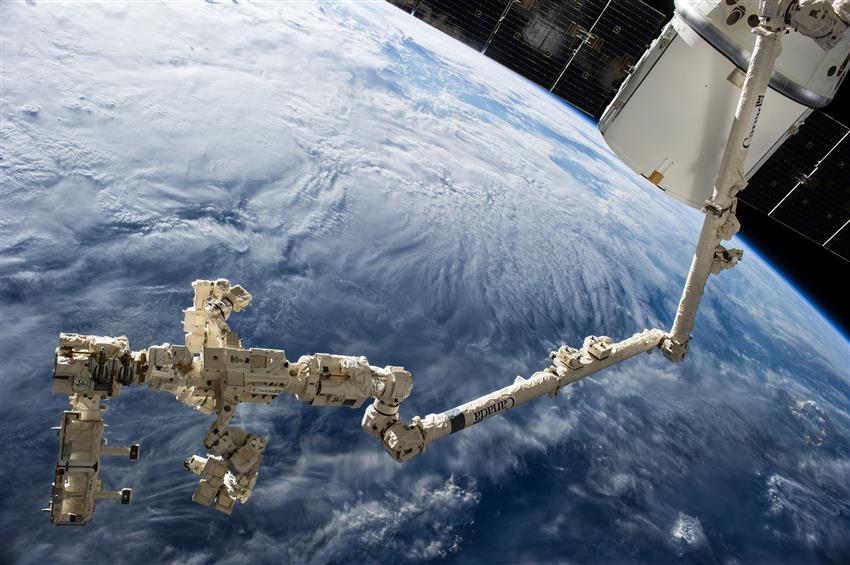Careers in space – Technicians and technologists
Are you a hands-on type of person? Do you love to tinker, repair and build things? By choosing a technical career in the space sector, you might get to build and tinker with actual spacecraft!
What do technicians and technologists in the space sector do?
Technologists and technicians are very important in the space field. They are on the frontlines of the building and testing process of spacecraft and systems.
Their technical skills are used in laboratory testing, construction of test equipment and instruments, model building, and research and development. They work closely with scientists and engineers to accomplish these tasks.
What is the difference between a technician and a technologist?
According to the Canadian Council of Technicians and Technologists, the difference lies in their education levels and work responsibilities.
- Technicians are practical specialists trained for jobs requiring technical expertise in specific tasks, such as troubleshooting, inspecting, maintenance, manufacturing, testing, sampling, repair, installation, basic design work and equipment operation.
- Technologists have practical skills and theoretical knowledge. In addition to their technical classes, they study advanced mathematics, engineering theory and scientific principles. This enables them to work in problem resolution, design, data interpretation, complex technical consultation, technical specification preparation, planning, analysis, project management and decision making. Many technologists obtain higher-level applied science and engineering positions as they acquire experience in the field.
What should I study to become a technician or technologist in the space sector?
Programs of study
As with all space careers, there are many paths you can take depending on the fields of work that interest you. Here are some of the disciplines you could choose from:
- Computer systems,
- electrical,
- electromechanical,
- electronics,
- mechanical engineering,
- physics engineering
There are many institutions and colleges in Canada that offer diplomas for technicians and technologists. You can visit the Canadian Council of Technicians and Technologists website for a list of accredited programs.
Education requirements
The education you need for a technical career in the space sector depends on the field and the level of specialization that you choose.
- Technical diploma – One to two years of study
- Institutes and colleges usually offer one- or two-year programs that teach practical technician skills.
- Engineering technology diploma – Two to four years of study
- Institutes and colleges usually offer two- to four-year programs to become technologists. These programs include practical technician skills as well as classes in mathematics, engineering and science.
What are some of the fields that technicians and technologists in the space sector work in?
Below are five of the main fields they work in, along with some associated job titles. Keep in mind that there are many other fields out there – this list is just to kick-start your search for a specialization that's right for you!
- Computer engineering
- Electrical and electronics engineering
- Mechanical engineering
- Robotics
- Telecommunications
Computer engineering
Computer technicians install, repair and maintain electronic systems and equipment in spacecraft. Working with an engineer, they may draw diagrams and build computer system prototypes that will be used to manipulate electronic signals. Here are some of the jobs they do in the space industry.
- Applications programmer
- Computer technician
- Programmer
- Technician for a software manufacturer
- Computer network technician
Electrical and electronics engineering
Electrical and electronics technologists and technicians offer technical services in the design, development and field testing of spacecraft equipment and electrical and electronic systems. Here are a few examples.
- Electrical engineering technician
- Electronics engineering technician
- Manufacturing and production support technician
- Microwave facilities maintenance technician
- Physics engineering technologist
Mechanical engineering
Mechanical technologists and technicians work with engineers to design, manufacture, maintain and test the machines, parts, tools and equipment required in space technologies. Here are some of the different jobs.
- Mechanical engineering technician
- Physics engineering technologist
- Robotics technician
- Thermal system designer
- Tool designer
Robotics
Robotics technologists and technicians work with engineers to develop robotic manipulators for spacecraft, such as the International Space Station's robotic arm, Canadarm2, and robotic manipulator, Dextre.
- Mechanical engineering technician
- Physics engineering technologist
- Robotics technician
Telecommunications
Telecommunications technicians support engineers in the development, implementation, evaluation, and maintenance of telecommunication networks that transmit digital data via physical cables, optical systems, or radio systems. As part of their work, telecommunications technicians may develop specific systems and application software, and establish maintenance and operating standards. They may also be required to analyze network problems and recommend solutions.
- Electrotechnician
- Radar technician
- Satellite technologist
- Satellite verification technologist
- Telecommunications technician


